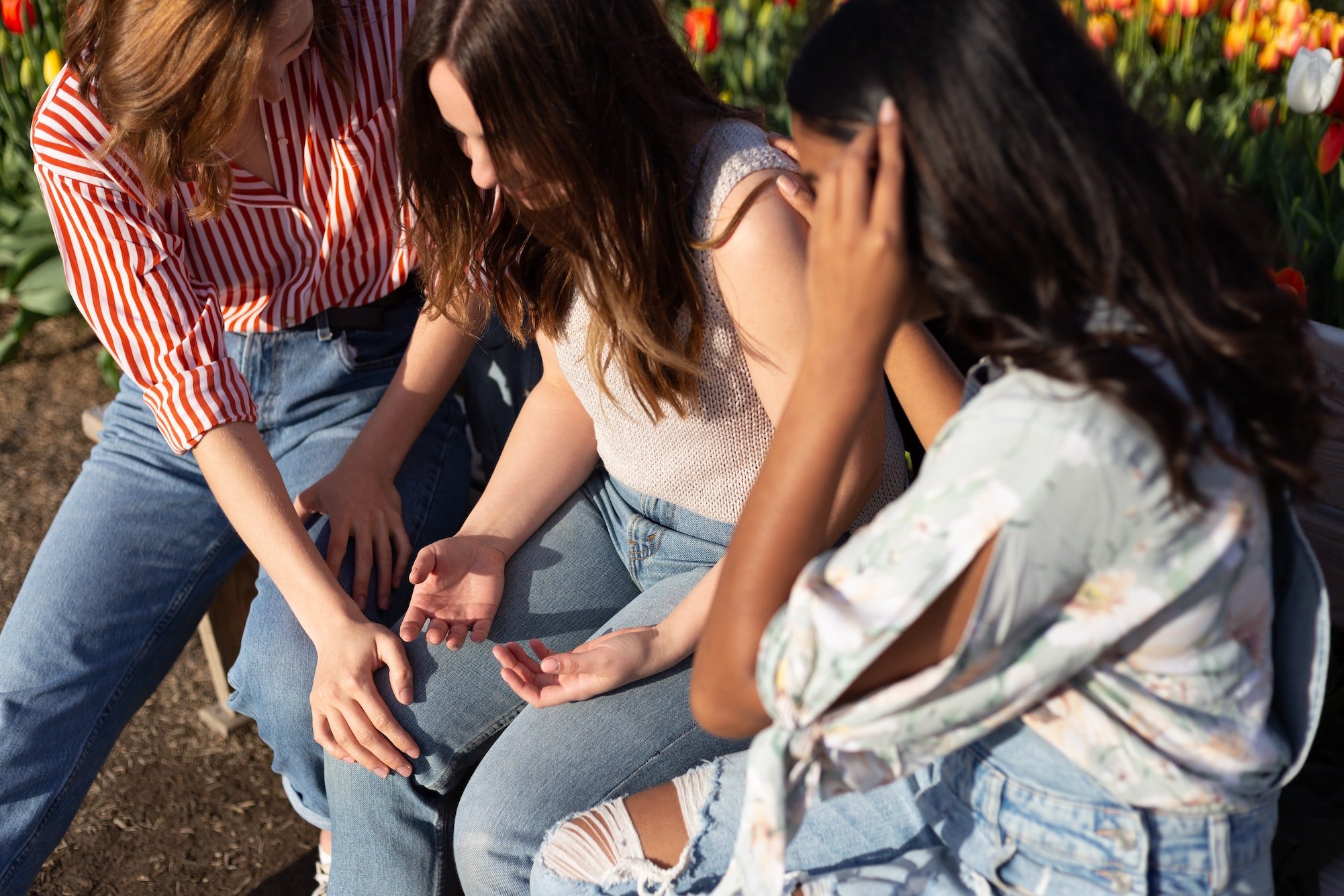EMBODIMENT | INTIMACY | SEX | PARENTING

We weren’t born with wounds. We experience ruptures relationally. Therapeutic healing, therefore, happens relationally. My groups fundamentally incorporate real-world issues related to sexuality, identities, social and cultural issues, and the family of origin. Our society teaches us to look for similarities when relating. This is fine, but it creates a problem related to how we have little skill to tolerate or even understand the significance of difference. In groups, members develop skills to work with the realness of difference. We co-create safe-enough spaces for self-actualization and new, significant relationship experiences. In this way, members experience new kinds of intimacy and belonging. This then translates into outside relationship-building.
**My groups are run through queer and feminist praxis. We explore issues of connection, disconnection, power, and formative life experiences with their impacts on sexuality, relationships, identity, and fluidity in different contexts.
Group Therapy: 2 weekly options
Tuesdays 9:15am-10:45am Hybrid-most participants in person [2 openings]
Wednesdays 5:05-6:35pm Online —with first Mondays 6-7:30pm in person/hybrid (no Wed mtg that week) [2 openings]
Feeling stuck? Want to explore aspects of your sexuality and/or your relationships?
This group intentionally makes space for difference regarding explorations of: lifestyles; sexual orientations; genders; identities; and, experience w/ attractions, desires, and arousal through therapeutic relational work.
Members co-create safe-enough spaces to practice grounding, develop insight and work on developing new relational tools.
Engagement in individual therapy (with a therapist who is versed in process groups) while in group therapy helps members get the best benefit out of both experiences.
Open to Adults 21 and over.
For parents with a child age 3 or younger
Bi-weekly Fridays 11:15am-12:45pm
$85 per session
In person, with hybrid option when needed
[beginning Spring 2025]
Why group therapy for parents?
Too often we are stratified by our different identities and values. This can happen even more as we engage in parenting: Who is seen as the good parent? Whose ideologies related to parenting styles are admired and whose are controversial and therefore shut down or negatively othered?
As a parent myself, I experienced othering (in a negative context) happening all the time in communities of parents, on social media, and if I am honest, within myself. This therapy group aims to honor the importance of differentiation as members engage honestly in understanding and caring about "other" within their exquisite complexity--not dulled out or disregarded. Afterall, isn't learning how to respectfully differentiate from one another essential for us as parents who will have to do this with our own children as they grow and change? This group is excellent prep and support for parents throughout the lifecycle!
Process Oriented Consultation Groups for Therapists
biweekly Thursdays 12pm-1:30pm
biweekly Fridays 9am-10:30am
Explore psychotherapy as it relates to sexuality, social status, identities, relational dynamics, intimacy building, transitional periods and growth, trauma processing, transference, countertransference, etc. Therapists who work with individuals, relationship therapy, and groups are all welcome.
Consultations include a combination of case consultations, especially in relation to "sticky" areas where exploration may be beneficial. The "here and now" process will be part of the group container. Long-term members build collegial relationships and a steady place to process material arising in casework.
Sessions are paid for monthly in advance of session dates. As this is a closed group, all sessions are included in the monthly charge.
Ideal participants are interested in building long-term collegiality and are inclined towards introspection, challenging assumptions, growing in connection, and understanding how all of this relates to their work in private practice.
Adjunctive one-on-one consultation sessions are available by appointment.
Inquire with Natashia about upcoming groups and/or individual AASECT Sex Therapy Supervision

What people are saying
“I have been finding out who I really am and how I communicate from myself and out to others during the Relational Process Group. I am learning to listen to myself with others reflecting back to me, and telling the truth about my inner thoughts and feelings, understanding more precisely about what I want or what I am feeling. I am learning to trust others--not to judge. I am connecting to my life force energy (and now, even know what that means!) in the most authentic way, moving through many difficult and uncomfortable layers to reveal a more calm, lit and loved (by self) person. I didn’t even know this could be a process through which I was capable of going through, or what would start to be revealed on the other side...it is turning into a whole new life and discovery of self: one I like more and more.”
Hello there, I’m Natashia .
I’m a Psychotherapist who specializes in group work and a Scholar who orients through a queer and feminist standpoint. I am here to support you in creating spaces where you explore yourself and walk the talk of embodied love, pleasure-filled sexuality, and modeling co-parenting in empowering ways. Change is amazing, and it’s also a lot of work. For many of us, our early models had some hardships, and we wish to learn new and different ways to be in a relationship with our partners and children. You don’t have to struggle on your own.
Frequently Asked Questions
-
I offer three groups: A weekly Relational Process Group, Nana’s House: A Postpartum Support Group through the first 3 years, and a Therapist Consultation Group. I also am hired to lead groups for short and long term purposes. Types of groups I offer include support groups, process groups and meditation groups with some processing time.
-
Primary parents who are anywhere from late pregnancy to 3 years postpartum.
-
Relational process groups are a kind of long term group therapy where participants learn how to be quite honest about their internal processes with one another. They get to realize how things that spark energy in them (whether negative or positive) within group, have so much to do with their individual histories and their learned strategies for dealing with people socially. People that join this group are interested in thinking about their own psychology and working on their relational skills, often healing old wounds and building new tools to develop greater intimacy. This groups often talks about sex and intimacy, but not exclusively. Members also discuss other real life issues and are interested in exploring their own expansiveness around growing, feeling their feelings and learning how to share and listen with greater empathy, compassion and care internally and externally.
-
Because we don’t heal in an isolated room by ourselves or just with one therapist or one partner. That can definitely be part of a healing process…but we need practice to learn and feel our triggers and work through them with others who are willing to play with new ways of dealing with old problems. Group therapy offers this kind of space. Many people who find group therapy useful remain for years as it is relatively inexpensive and offers so much multiplicity in what you can learn or how you can grow week to week. Plus, it’s groups offer a kind of safe “family” feeling environment to learn how to come into your own and how to support others.
-
Process groups are amazing in their therapeutic value for people who come with good insight and stability. Most of the time this means people who have done a fair amount of individual therapy and understand how to process inter-relationally. Process groups are a traditional form of psychotherapy. I include the wording, “sexuality” to invite members to do what traditional psychotherapy has not had a good track record with—that is to include and explore conversation around issues related to sexuality. Sexuality is a deeply unique and personal experience, and it is also in and around our shared experiences constantly. The more we learn to make brave spaces to process our inherited shames and our wonderful juicy pleasures, the more accepting we can be of ourselves and each other.

Right now, you are likely busy and in great need of time and space to explore how you feel, what you want, and how you can be socially caring within the community. You probably know that without support in figuring out new ways of being with your body and mind and with your partner’s, you won’t be able to raise your children to care about themselves and their communities any differently.






